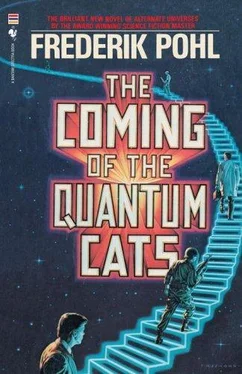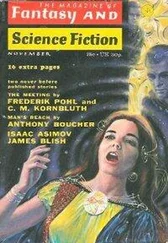Frederik Pohl - The Coming of the Quantum Cats
Здесь есть возможность читать онлайн «Frederik Pohl - The Coming of the Quantum Cats» весь текст электронной книги совершенно бесплатно (целиком полную версию без сокращений). В некоторых случаях можно слушать аудио, скачать через торрент в формате fb2 и присутствует краткое содержание. Год выпуска: 1986, ISBN: 1986, Издательство: Bantam Books, Жанр: Фантастика и фэнтези, на английском языке. Описание произведения, (предисловие) а так же отзывы посетителей доступны на портале библиотеки ЛибКат.
- Название:The Coming of the Quantum Cats
- Автор:
- Издательство:Bantam Books
- Жанр:
- Год:1986
- ISBN:9780553763393
- Рейтинг книги:5 / 5. Голосов: 1
-
Избранное:Добавить в избранное
- Отзывы:
-
Ваша оценка:
- 100
- 1
- 2
- 3
- 4
- 5
The Coming of the Quantum Cats: краткое содержание, описание и аннотация
Предлагаем к чтению аннотацию, описание, краткое содержание или предисловие (зависит от того, что написал сам автор книги «The Coming of the Quantum Cats»). Если вы не нашли необходимую информацию о книге — напишите в комментариях, мы постараемся отыскать её.
The Coming of the Quantum Cats — читать онлайн бесплатно полную книгу (весь текст) целиком
Ниже представлен текст книги, разбитый по страницам. Система сохранения места последней прочитанной страницы, позволяет с удобством читать онлайн бесплатно книгу «The Coming of the Quantum Cats», без необходимости каждый раз заново искать на чём Вы остановились. Поставьте закладку, и сможете в любой момент перейти на страницу, на которой закончили чтение.
Интервал:
Закладка:
I hesitated. "I don't know if you all know what was going on at Sandia—"
Lavrenti said, "Oh, yes, I think so, dear Mrs. Bowquist. Even I had heard something."
"You can speak freely," said the senator. "If it ever was a secret, it isn't now."
"Well—the senator said something about a double of himself. Exact. I mean, even with the same fingerprints. They wanted him to confront this other man."
"Exactly," said Gary Hart triumphantly. "It's just what we thought, Senator. That man on television wasn't our own Dom DeSota at all."
The Senator nodded. Then he gestured to the butler. "We'll take our coffee in my study, Albert," he said, and then to us, "Let's take another look at this guy on TV."
Even so, it took me a long time to understand what they were saying. We were in the study—not what I would have called a study; it was bigger than my own living room in Chicago, big enough for war councils and off-the-record meetings of a dozen or more. It had four television monitors plus the big screen; it had news-wire CRT's for INS and AP; most of all, it had a videotape machine. Jack Kennedy sat in the corner of the room nearest the air-conditioning exhaust with his cigar, gnawing on his knuckle as he watched the replay of Dom's face, speaking in Dom's voice the words that I could not believe Dom would ever say.
And neither could Jack Kennedy. "What do you think?" he asked the room at large. No one spoke, and I realized the Harts were looking at me.
For a moment I wondered if, after all, they were blaming me for Dom's incredible turnabout. The guilty conscience again, of course.
Then I had a second thought.
"Run it again, will you?" I asked, my voice beginning to shake, and fumbled in my bag for the glasses that I never wore in public. I looked harder at my love's face, studying every line, listening to every tone, watching every gesture.
I said doubtfully, "He looks very thin, doesn't he? As though he were under some kind of strain-or else-"
"Or else," said Hart, "we were right about that, too, Senator. That isn't our Dom DeSota. It's theirs."
"I knew it," piped Jackie, who had moved over to the arm of my
chair. I felt her hand on my shoulder, mothering me. I could have kissed her. A constriction I hadn't known was there fell away from my chest. Oh, Dom! You might be an adulterer, but at least you weren't a traitor! .
"I think," announced the senator, "that we might just take a look at that CIA summary now, Gary." He took a folded sheaf of paper from his aide, put his own glasses on, and glanced at the top page.
I wasn't listening. I was too filled with relief. It didn't make everything all right, quite. There was still Ferdie. Not to mention Marilyn DeSota. But at least one sharp, shocking pain had eased.
I wondered what time it was. If I could excuse myself soon and get back to my hotel—if I could call Ferdie still tonight, before he went to sleep—maybe now I could go through with it and tell him what I was so frightened to say. Of course, there was still Marilyn— Of course there was still Marilyn! What was I thinking of? How could I tell my secret without telling Dom's too? And how could I do that without at least warning Dom first?
Dissolved again in doubt, I tried to pay attention to what Jack Kennedy was saying. ". . . two people," he said. "One was a smart Albuquerque cop. The other was a smart FBI woman they put in shorts on a bicycle, out on the mountain where the other guys had occupied a television transmitter. Neither one had any difficulty getting the enemy soldiers to talk."
"Lousy security," said Hart, frowning.
"Lousy for them. Good for us," said jack. "Anyway, they didn't say anything—at least they didn't say much—about military matters. But the cop and the FBI woman did get them talking about the differences between their world and ours. I think we have a pretty good idea now of where their history and ours are different."
I tried to listen with comprehension to the rest of what Jack Kennedy was saying. It wasn't easy. What I know about is music; there weren't very many history courses when I went to Juilliard. For that matter, it was hard for me to grasp what was meant by "parallel times," though Dom had explained it to me. As a theory. As reality it was a whole lot harder to accept.
"Their enemies," Jack said, "seem to be the Soviet Union and the People's Republic of China."
He paused, glancing at the ambassador, who sank down in his chair, frowning, without comment. "Which China?" I asked, as anyone would—did they mean the Korean Mandate, or Han Peking, or the Hong Kong Suzerainty, or Manchukuo or the Taiwanese Empire or any of the other twelve or fifteen pieces China had splintered into after the Cultural Revolution?
"Just one China," said jack. "They managed to hang together, and now—for them—they're the biggest nation on Earth."
We all looked at each other. That was hard enough to swallow. The idea of the Soviet Union threatening anybody any more was even crazier. I tried to read Lavi's expression, but he had none. He was just listening, and after a moment he stretched out a hand and took one of the senator's cigars, though I knew that normally he didn't smoke. He kept his eyes down on it, slowly unwrapping the foil, not speaking at all.
I could see why he was having as much trouble with all this as I was, although for different reasons. It was, after all, the nuclear exchange with the U.S.S.R. that had sparked the Cultural Revolution in China. What it had done to the Soviet Union was even worse. Moscow gone, Leningrad gone, basically the whole country decapitated.
I tried to remember Russian history. There'd been the czars. Then Lenin, who got assassinated or something. Then Trotsky, who got them into a series of border wars with places like Finland and Estonia, most of which he lost. Then Lavrenti's own grandfather for a while—with all kinds of internal famines and insurrections—who started the nuclear project, which got us into the atom-bomb race, which only ended when the Chinese zapped Moscow and the nuclear project, all at once. .
But in their time, it seemed, Trotsky never did take over the U.S.S.R., though Lavrenti's grandfather did. There wasn't a series of border wars. There was one big one. They called it World War II, and it was with a man named Hitler, a German, out to conquer the world, and very nearly making it before the rest of the world united against him.
That was a stunner. Germany was just one country! I'd played there! It wasn't anywhere nearly big enough to threaten the whole world!
And besides—there was Lavrenti, sitting across the room from me, slowly igniting his Cuban Claro. Of course, he was nominally a Communist. But the Russians were nowhere near as militant as, say, the English Bolsheviks, with their centers of aggression in all their so-called commonwealth federated republics. Thank heaven Canada and Australia had split off. . . . I shook my head. It didn't make much sense to me.
It did, unfortunately, to Lavrenti Djugashvili. He had smoked the first half-inch of his cigar by the time Kennedy finished with the CIA report, and expected it when the senator stopped and looked inquiringly directly at him. "I take your point," said Lavi. "This is a matter of concern. If this invasion of your country is in the final analysis directed at mine-"
"Not at yours exactly, I think," Jack said quickly. "At the Soviet Union that exists in their time, I would suppose."
"Whose people," Lavi said heavily, "are still my own, are they not?"
Kennedy didn't say anything. He only gave a fraction of a nod.
Lavi stood up. "With your permission, dear Mrs. Kennedy," he said somberly, "I think I must visit my embassy now. I thank you for this information, Senator. Perhaps something should be done, although I do not now see just what."
Читать дальшеИнтервал:
Закладка:
Похожие книги на «The Coming of the Quantum Cats»
Представляем Вашему вниманию похожие книги на «The Coming of the Quantum Cats» списком для выбора. Мы отобрали схожую по названию и смыслу литературу в надежде предоставить читателям больше вариантов отыскать новые, интересные, ещё непрочитанные произведения.
Обсуждение, отзывы о книге «The Coming of the Quantum Cats» и просто собственные мнения читателей. Оставьте ваши комментарии, напишите, что Вы думаете о произведении, его смысле или главных героях. Укажите что конкретно понравилось, а что нет, и почему Вы так считаете.












